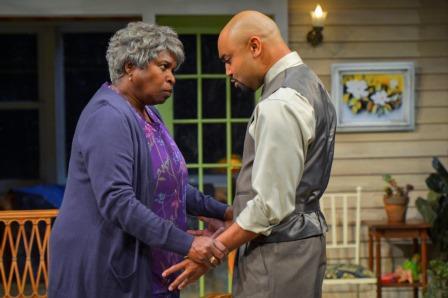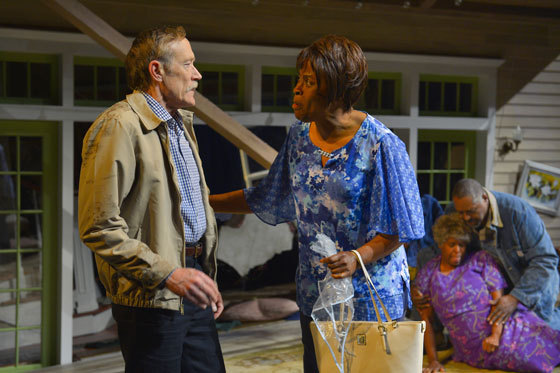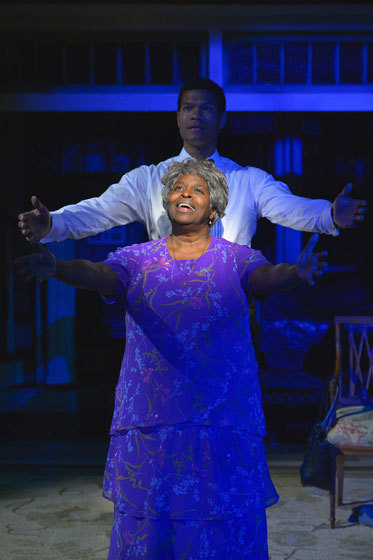NOTE: This post includes graphic images.
I hadn't planned on taking a vacation this year and, even if I had, Kaiser Hospital would not have been my destination of choice. But life is full of surprises and, following a 10-day stay, I was discharged in remarkably good shape.
My troubles began several hours after attending a performance of The Book of Mormon. If you've never experienced reverse peristalsis, it's a powerful demonstration of how your body tries to reject something it doesn't like. For the next two days I could barely hold down any solids. Even pills came flying back out of me with a vengeance.
After speaking to an online nurse and, subsequently, an on-call physician, I realized that I would have to be checked out in one of Kaiser's clinics. But timing was a problem. Kaiser's first opening was for 6:45 p.m. on a Friday evening when I was scheduled to attend an 8:00 p.m. performance at Berkeley Rep. If that time slot wasn't convenient, they suggested calling between 7:00 and 9:00 a.m. the next morning. Realizing that, as long as I stuck to sipping water, I could get through the evening without any projectile vomiting, I came up with a feasible alternative plan.
Following the performance, my friend and I rode BART from Berkeley back into San Francisco. After exiting the Powell Street station, I grabbed a cab to the Emergency Room for a long and mostly sleepless night highlighted by a series of x-rays and a contrast CT scan. The results showed an intestinal blockage where the small intestine seemed to narrow down like an hourglass. Before a surgeon could operate on me, I would have to spend several days on a nasogastric suction tube and hope that, with a steady infusion of intravenous fluids, we could stimulate some movement in my digestive tract.
The afternoon prior to my scheduled surgery, I had a breakthrough that felt like I had given birth to a small island in the South Pacific ("Dear Diary: Today they gave me my first suppository -- how cool is that!"). Following a second fecal eruption, I began to wonder if I should write a sequel to Roald Dahl's famous children's book (James and the Giant Peach) and call it George and the Giant Turd.
Bottom line? If someone ever accuses you of being full of shit, trust me when I tell you that they have absolutely no idea what they're talking about!
Computers and other technological advances have had a huge impact on hospitals since I worked at St. Luke's back in the 1970s (when we were still typing reports on carbon sets). Kaiser's impressive system monitors the exact time a patient is given a dose of any medication (and will not permit a nurse to give the next dose earlier than prescribed).
When my surgeon came by to check up on me following my exploratory laparotomy, she informed me that she had performed a partial small bowel resection. Not only was she able to explain that my problem had been caused by a Meckel's diverticulum, she was even able to pull up an image taken by the laparoscopic camera and provide me with a copy of its JPG file.
A snapshot taken during my surgery of the Meckel's diverticulum
that caused an obstruction in my small intestine (the
whitish bulbous tip is some ectopic pancreatic tissue)
Perhaps the strangest part of my stay occurred immediately following my surgery, when I was wheeled into a different hospital room to rest while the effects of the anesthesia wore off. By this time, it was nearly 8:00 p.m. and the usual bustle had quieted down.
Unlike the rooms on the sixth floor's Med-Surg unit (which were painted in beige), the rooms on the fourth floor were painted in a dark, forest green. When one of the night nurses came in to take my vital signs, I started complimenting her on the room's color scheme. Thankfully, she understood that it was the anesthesia talking.
Because I was feeling no pain -- and, quite amazingly, had none during my entire hospital stay -- I felt as if I had landed in a science fiction film. There I was (just like Keir Dullea in 2001: A Space Odyssey), propped up in a sitting position, surrounded by silence and staring at a soothing green wall with a sense of idiotic wonderment.
Having once worked as an in-house medical transcriptionist, I've never been afraid of hospitals. One reason is that, whether on staff or as a patient, you encounter all kinds of people with interesting back stories. Among the standouts during my hospital stay were:
- An elderly woman on the janitorial staff who would happily stop what she was doing in order to serenade patients with her rendition of "Moon River" or the stylings of Doris Day (you haven't lived until you've heard "Secret Love" sung with a thick Filipino accent). The day after I suggested that she look up Ethel Merman on YouTube, she entered my room and started belting out "There's No Business Like Show Business."
- A middle-aged nurse who confessed that, although her husband was a big jock who liked to go to sports events, she would much rather spend time in a museum examining a work by Piet Mondrian. When I told her that many famous art museums are now putting their collections online, her eyes lit up like she had just seen Santa Claus.
- I was quite impressed with the strong empathic streak displayed by many of the young male nurses (mostly Mexican, Chinese and Filipino), whose caring nature was in sharp contrast to so many other men their age.
- There was also a middle-aged Chinese nurse who was all business and had no interest in gossiping with her co-workers. However, when I told her that I had gone to a performance at Berkeley Rep on Friday night, her entire demeanor changed. "When I was a kid, our school used to take us on field trips to Berkeley Rep," she told me. "As soon as my kids are old enough, I'm going to sign them up for those trips. Berkeley Rep rocks!"
Which brings me back to the issue at hand: As the old saying goes, "Well, other than that, Mrs. Lincoln, how did you like the play?"
* * * * * * * * * *
As one entered the Berkeley Rep's Thrust Stage Theatre, the sight of a handsome African American actor (Sullivan Jones) seated stage center was a bit unnerving. As his gaze pivoted from side to side, he might have reminded some people of a Disney-style audio animatron. His role in Head of Passes, however, is quite different.
He is a calming, benign Angel of Death who has come to visit Shelah (Cheryl Lynn Bruce), a cantankerous old woman who has suffered a lifetime full of trials and tribulations. Despite its precarious future in the face of severe storms battering the marshy area of Louisiana where the Mississippi River branches off into three separate directions as it nears the Gulf of Mexico, Shelagh refuses to leave her increasingly waterlogged home.
Set in her ways and stubborn as a mule (she won't even allow "deviled eggs" in her home), Shelah has relied on her faith to get her through life's trials -- whether they be a philandering husband who brought home a baby he had fathered with another woman (so that Shelah could raise it) or the recent revelation that she has a pernicious, terminal lung disease which is rapidly eroding her health.
Shelah (Cheryl Lynn Bruce) and her son, Aubrey (Francois Battiste)
in a scene from Head of Passes (Photo by: Kevin Berne)
Although Shelah tries as hard as she can to shower her grown children with unconditional love, she's no fool. Painfully aware that her oldest son, Spencer (Brian Tyree Henry), is a bit of an oaf and his kid brother, Aubrey (Francois Battiste), is a classic manipulator, Shelah clings to the hope that her children will rise above their imperfections.
Aubrey, who desperately wants Shelah to leave her home and come live with him (nearly an hour's drive away), has concocted plans for a surprise birthday party for his mother which will be attended by her best friend, Mae (Kimberly Scott), her physician (James Carpenter), and her stepdaughter, Cookie (Nikkole Salter). He's even hired Crier (Jonathan Burke) to sing at the party and help out with the refreshments.
Dr. Anderson (James Carpenter) and Mae (Kimberly Scott)
in a scene from Head of Passes (Photo by: Kevin Berne)
Berkeley Repertory Theatre recently presented the West Coast premiere of Tarell Alvin McCraney's powerful family drama (which had received its world premiere in April 2013 from the Steppenwolf Theatre Company in Chicago). At the very least, Berkeley Rep's production was worth seeing for G.W. Skip Mercier's amazing set. Add in a string of powerhouse performances (dominated by Cheryl Lynn Bruce's bravura portrayal of the family matriarch) and Head of Passes proved to be an electrifying evening of theatre.
Much of the credit for the evening's success rightfully goes to McCraney, a young and extremely gifted African-American playwright who can easily shift gears from the catty banter and bickering shared between family members and old friends to exquisitely crafted moments of poignancy and poetry in which an old woman's faith is tested in ways she never could have anticipated.
McCraney is quick to assert that Shelah's woes are modeled on the endless suffering of Job in the Old Testament. However, thanks to director Tina Landau, McCraney's script builds to powerful crescendos that match the brutality of the storm bearing down on Shelah's home as well as her near-operatic questioning of her faith. This is an extremely ambitious drama which suffers and soars with each new insult to Shelah's life.
Shelah (Cheryl Lynn Bruce) basks in the presence of an
Angel (Sullivan Jones) in a scene from Head of Passes
(Photo by: Kevin Berne)
To read more of George Heymont go to My Cultural Landscape




